chemistry
FOR THE BEST ASSIGNMENTS AND HOMEWORKS ,TO HELP AND TUTORING ALL KIND OF EXAMS
I have done papers of various topics and complexities. I am punctual and always submit work on-deadline. I write engaging and informative content on all subjects. Send me your research papers, case studies, psychology papers, etc, and I’ll do them to the best of my abilities. Writing is my passion when it comes to academic work. I’ve got a good sense of structure and enjoy finding interesting ways to deliver information in any given paper. I love impressing clients with my work, and I am very punctual about deadlines. Send me your assignment and I’ll take it to the next level. I strive for my content to be of the highest quality. Your wishes come first— send me your requirements and I’ll make a piece of work with fresh ideas, consistent structure, and following the academic formatting rules.
I'm an expert on major courses especially; All AQA, OCR, A & AS LEVELS AND GCSE, Chemistry, Psychology, Nursing, Mathematics. Human Resource Management. Quality work is my priority. I ensure scholarly standards in my documents. Use my work for GOOD GRADES. In requirement of case studies, test banks, exams and many other studies document our site helps in acquiring them all.
If in need of any revision document you can go to the inbox and you will be attended to right away.
SUCCESS and BEST OF LUCK.
- 1344
- 0
- 52
Community
- Followers
- Following
41 Reviews received
1398 items
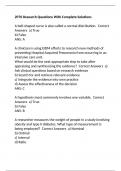
2P70 Research Questions With Complete Solutions
2P70 Research Questions With Complete Solutions
- Exam (elaborations)
- • 8 pages •
2P70 Research Questions With Complete Solutions
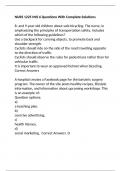
NURS 1225 MIS 6 Questions With Complete Solutions
NURS 1225 MIS 6 Questions With Complete Solutions
- Exam (elaborations)
- • 17 pages •
NURS 1225 MIS 6 Questions With Complete Solutions
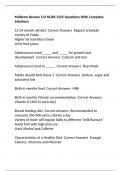
Midterm Review 5/6 NURS 1225 Questions With Complete Solutions
Midterm Review 5/6 NURS 1225 Questions With Complete Solutions
- Exam (elaborations)
- • 7 pages •
Midterm Review 5/6 NURS 1225 Questions With Complete Solutions
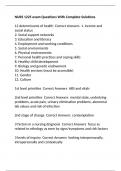
NURS 1225 exam Questions With Complete Solutions
NURS 1225 exam Questions With Complete Solutions
- Exam (elaborations)
- • 41 pages •
NURS 1225 exam Questions With Complete Solutions
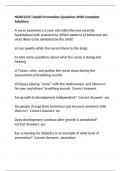
NURS1225: Health Promotion Questions With Complete Solutions
NURS1225: Health Promotion Questions With Complete Solutions
- Exam (elaborations)
- • 6 pages •
NURS1225: Health Promotion Questions With Complete Solutions
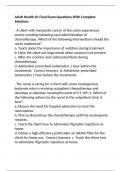
Adult Health III: Final Exam Questions With Complete Solutions
Adult Health III: Final Exam Questions With Complete Solutions
- Exam (elaborations)
- • 61 pages •
Adult Health III: Final Exam Questions With Complete Solutions
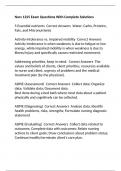
Nurs 1225 Exam Questions With Complete Solutions
Nurs 1225 Exam Questions With Complete Solutions
- Exam (elaborations)
- • 20 pages •
Nurs 1225 Exam Questions With Complete Solutions
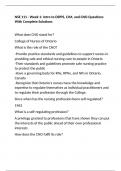
NSE 111 - Week 1: Intro to DIPPS, CJM, and CNO Questions With Complete Solutions
NSE 111 - Week 1: Intro to DIPPS, CJM, and CNO Questions With Complete SolutionsNSE 111 - Week 1: Intro to DIPPS, CJM, and CNO Questions With Complete Solutions
- Exam (elaborations)
- • 13 pages •
NSE 111 - Week 1: Intro to DIPPS, CJM, and CNO Questions With Complete SolutionsNSE 111 - Week 1: Intro to DIPPS, CJM, and CNO Questions With Complete Solutions
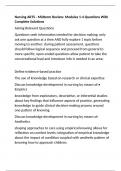
Nursing ARTS - Midterm Review: Modules 1-4 Questions With Complete Solutions
Nursing ARTS - Midterm Review: Modules 1-4 Questions With Complete Solutions
- Exam (elaborations)
- • 28 pages •
Nursing ARTS - Midterm Review: Modules 1-4 Questions With Complete Solutions
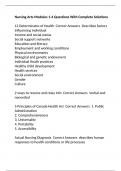
Nursing Arts Modules 1-4 Questions With Complete Solutions
Nursing Arts Modules 1-4 Questions With Complete Solutions
- Exam (elaborations)
- • 27 pages •
Nursing Arts Modules 1-4 Questions With Complete Solutions

FISDAP - Paramedic Unit Exam Study Guide Topic: Airway, Ventilation and Respiratory
Pharmacology Clear and Simple- A Guide to Drug Classifications and Dosage Calculations 3rd Edition Watkins Test Bank
Chicago State University: NURS MISC Exam 3 Questions and Answers,100% CORRECT
NURS 3320 Test Bank Intravenous Therapy Questions and Answers and Rationale,100% CORRECT
Thankful
AANP Board Questions AND ANSWERS| A RATED